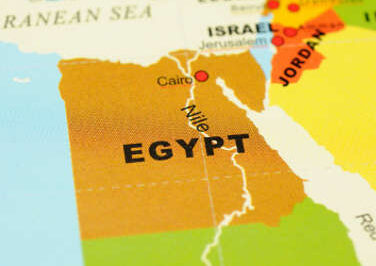
pleaded not guilty on Saturday as the Coptic community mourned the
loss of yet another victim of apparent anti-Christian
violence.
The three men
allegedly sprayed a crowd with gunfire after a Christmas service in Nag Hammadi, Egypt,
on Jan. 6. In addition to the seven that were killed, nine others were wounded.
The killings were the worst act of anti-Coptic violence since January 2000, when
20 Copts were killed in sectarian fighting in Al-Kosheh.
Defendants
Mohammed al-Kammuni, Qorshi Abul Haggag and Hendawi Sayyed appeared Saturday in
an emergency security court in Qena, a city 39 miles north of Luxor.
In front of the
packed courtroom, the three men said little at the hearing other than to enter
their plea before Judge Mohammed Adul Magd, according to one attorney present at
the hearing. The men are charged with premeditated murder, public endangerment
and damaging property.
Numerous Muslim
attorneys volunteered to defend them for free as seven attorneys representing
the interests of the victims looked on. The next hearing is set for March
20.
Even as the men
entered their pleas, the Coptic community mourned the loss of yet another
Christian, this one shot dead by police. On the evening of Feb. 9, Malak Saad, a
25-year-old Coptic carpenter living in Teta in Menoufia Province, was walking
outside a meeting hall that police had seized from Christians when he was shot
through his chest at close range. He died instantly.
Scant details
are known about the shooting. Police surrounded the entire village and closed it
to all reporters. In a statement, officials at the Interior Ministry said the
Saad was killed by mistake when a bullet discharged while a police guard was
cleaning his weapon. The Interior Ministry said the shooter has been detained
and will be tried in a military court. Such courts are traditionally closed to
the public.
One of Saad’s
cousins, who requested anonymity, disputed the Interior Ministry’s version of
the incident. He said that the guard had used the bathroom inside the
meeting hall and had come outside of the building when he exchanged a few words
with Saad and shot him at close range. The bullet went completely through Saad’s
chest.
The building in
question had been Coptic-owned for 16 years, but two days prior to the shooting,
police seized it after a group of Muslims started a rumor that the owners
planned to convert the hall into a church building.
Disputes over
worship venues are common in Egypt. Copts and other Christians are extremely
restricted in opening or even maintaining houses of worship because of complex
government statutes. Anti-Christian elements within Egyptian society often use
the statutes to harass Christians, Christian leaders said.
Christians
Arrested
Following
the Jan. 6 shootings, in a move that Christian leaders said was designed to
silence the Coptic community’s protests, police began going door to door and
arresting Coptic men in their late teens and 20s. Reports vary widely on the
numbers of how many men were arrested, but 15 arrests have been
confirmed.
Early in the
morning of Jan. 8, officers from State Security Intelligence appeared at the
home of Tanios Samuel looking for a different house. When officers realized they
were at the wrong home, they arrested his brothers, Fady Milad Samuel, 21, and
Wael Milad Samuel, 24.
“We are Copts.
It is their country, they will do whatever they want,” Tanios Samuel said about
the arrests.
He said the
government is using his brothers and the others arrested as pawns to silence
dissent. He said he lives in fear for himself and his
brothers.
“The families
are very scared – scared of violence, getting threats all the time,” Samuel
said. “All we want is peace.”
Last month’s
attack brought widespread outrage across the Coptic community and from human
rights groups around the world.
Since his rise
to power in 1981, Egyptian President Hosni Mubarak
has avoided classifying any anti-Coptic attack as part of a larger sectarian
struggle within the country. His critics however, have long said his policies or
lack thereof contribute greatly to the anti-Christian climate within the
country.
Although
freedom of religion is guaranteed in Egypt’s constitution, Islam is the official
state religion. In public schools, the Quran is used to teach
Arabic.
On
Jan. 21, Mubarak made an uncharacteristically strong statement about the
shootings to MENA, the government-run news agency.
“The
criminal act in Nag Hammadi has bled the hearts of Egyptians,” he said. “I
hasten to affirm that the reasonable people of this nation, and its religious
leaders and thinkers … bear the greater responsibility to contain discord and
ignorance and blind fanaticism and to confront the despicable sectarian strife
that threatens the unity of our society.”
Despite
Mubaraks’s comments, the government
has characterized the attack as either a random criminal act or as one done in
reaction to a November incident in which a 21-year-old Christian man allegedly
raped a 12-year-old Muslim girl.
In an interview
with BBC Arabic, Dr. Fathi Sourour, head of the Egyptian Parliament, said, “The
Nag Hammadi shooting of Christians on Christmas Eve was a single criminal act,
with no sectarian dimensions.” He added that the crime was “prompted by the
‘death’ of a Muslim girl as a result of being raped by a Copt.”
Later,
commenting on a report about the incident, he described the shootings as “a clash between two brothers living in one
home.”
Copts, however,
have a starkly different impression of the shooting.
Georgette
Qillini, a Coptic member of the Egyptian Parliament, described the attack as “a
purely sectarian crime and by no means an individual criminal attack,” the
Egyptian newspaper Al-Ahram reported.
Ibtessam
Habib, another Coptic Parliament member, agreed that “sectarian rather than
personal motives lie behind the Nag Hammadi attack.”







Leave a Comment
You must be logged in to post a comment.